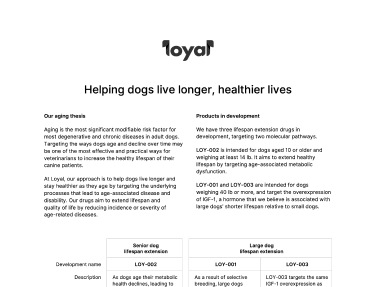Help us
help you
help dogs
Join our mission to help dogs live longer, healthier lives
Our team of veterinarians, scientists, and dog lovers is pioneering new research focused on understanding and treating the underlying causes of canine aging. Participate in our clinical trials and bring important benefits to our research and to your practice.
Get involved
Your veterinary colleagues at Loyal









The importance of collaboration
For any dog health product there are three key stakeholders: the dog, their owner, and their vet. We design our products with each stakeholder’s perspective and needs in mind.
Veterinarians like you play a key role bringing academic discoveries to market safely and effectively. We take this partnership seriously and look forward to working together to bring forward a new class of medicines.
Our commitments
Learn more
A veterinary clinical trial is a research study conducted on veterinary patients and designed to determine whether a new medical, surgical, or behavioral intervention is safe and effective. Although veterinary clinical trials only enroll veterinary patients, the results often have impacts for both veterinary and human medicine.
General practice veterinarians can benefit from participating in clinical trial research in a variety of ways. Most importantly, participation in a veterinary clinical trial can lead to:
Improved pet health. Including more patients from primary-care populations increases the size and power of veterinary clinical trials. That, in turn, improves the quality of the research results and makes them more reliable and more broadly applicable. When general practice veterinarians participate in clinical trials, they contribute to evidence-based medicine and help advance pet health overall.
Individual and professional growth. A clinical trial offers valuable opportunities to learn about cutting-edge veterinary medicine and the strengths and limitations of research results. Participating offers a fresh perspective on veterinary medicine and can help demonstrate skills that are now in demand. Veterinarians with experience conducting clinical trials are increasingly sought after by the animal health industry, which needs to produce high quality evidence for regulators to market their products.
Increased revenue and enhanced reputation for the practice. Many clinical trials offer financial compensation and other incentives to encourage enrollment and continued engagement. Participation can also distinguish a practice as one that offers top quality care and a broad range of treatment options.
Trials vary, but generally, participation does not require special skills or knowledge beyond those used in standard veterinary appointments. A typical clinical research trial visit includes a physical examination, taking lab samples, and completing a short questionnaire. If special knowledge and/or skills are needed, the clinical research trial sponsor can quickly bring you up to speed and may offer compensation for training time.
All medical procedures involve some measure of risk; however, any new medical, surgical, or behavioral intervention that is being investigated in a clinical trial has been demonstrated to be safe in preclinical studies and has met the FDA’s strict requirements for allowing further research in companion animals.
Clinical research trial contracts typically specify that veterinarians and staff have no liability associated with adverse events related to the intervention or the study.
Veterinary clinical trials cover a wide range of topics and investigate a variety of different types of drugs and devices. Loyal is a clinical-stage veterinary medicine company that is specifically focused on developing drugs intended to delay and reverse canine aging. We want to improve the healthspan (quality of life) and lifespan (years of life) for dogs.
As you undoubtedly see in your practice every day, aging impacts the health of every pet. Because Loyal’s clinical research trial is aimed at improving canine healthspan (quality of life) and lifespan (years of life), the drugs we are developing have the potential to help all dogs live longer, healthier lives.
As the clinical trial sponsor, Loyal will cover any costs associated with our trials (including all lab work and examination fees). To encourage participation and continued engagement, we also provide generous incentives for both the veterinary practice and enrolled clients.
At Loyal, we understand the demands your staff has to manage every day. That’s why we created incentives that can help compensate for their time. It is also worth noting that participating in clinical trial research offers a way for your staff to contribute in a meaningful way to the veterinary profession and improve pet health, while also advancing their knowledge, skillset, and loyalty.
The drugs Loyal is developing do not target one specific disease. Instead, our research is focused on canine aging, which impacts all dogs. That means the enrollment criteria for our clinical trial is quite broad, and we believe that many of your clients will want to participate. Loyal also offers recruitment support, including educational materials and client compensation.
At Loyal, we have designed our clinical protocols to be easy to understand and execute so that they can fit easily into your practice’s busy schedule. After the initial screening appointment, an enrolled patient will need to visit twice a year for an appointment that includes a physical exam, the collection of lab samples, and completion of a short questionnaire.
For more information, please visit the Loyal blog. If you would like to talk to a veterinarian on Loyal’s clinical staff, please fill out the form below or email vets@loyalfordogs.com.







